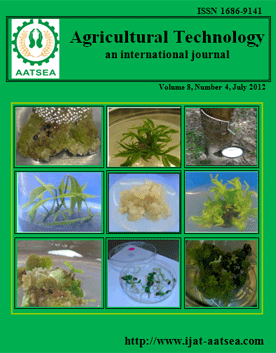ThaiScience
ThaiScience
INTERNATIONAL JOURNAL OF AGRICULTURAL TECHNOLOGY
Volume 14, No. 05, Month SEPTEMBER, Year 2018, Pages 661 - 674
Efficacy of silicon and titanium nanoparticles biosynthesis by some antagonistic fungi and bacteria for controlling powdery mildew disease of wheat plants
Farhat, M. G., Haggag, W. M., Thabet, M. S. and Mosa, A. A.
Abstract Download PDF
Nanoparticles of silicon and titanium were biologically synthesized from different bacterial and fungal isolates. The most promising results were obtained with TEM microscopy revealed that Pseudomonas putida (PpFT1) produced the small size of both nano silicon (SNPs) ranged from 1.52 to 8.73 nm and nano titanium (TNPs) from 5.81 to 8.95 nm. While, SNPs and TNPs that synthesized by Trichoderma harzianum (ThFT1) ranged from 5.0 to 9.0 nm and 2.0 to 16.0 nm, respectively. The SNPs and TNPs were tested as seed soaking and subsequent foliar spray, treatment, to powdery mildew on wheat seedling under greenhouse conditions. The most effective treatments were SNPs at concentration of 100 and 150 ppm obtained by P. putida (PpFT1) and Bacillus subtilis (BsBN3) at concentration of 50, 100 and 150 ppm which reduced the powdery mildew severity by 83.3, 89.7, 84.6 and 91.0 % respectively. While, SNPs at concentration of 150 ppm obtained by T. harzianum (ThFT1) reduced the powdery mildew severity by 82.0 %. Meanwhile, other concentrations showed moderate effect. Nano titanium obtained by antagonistic fungi i.e. T. harzianum (ThFT1), T. viride (TvGK2) and T. hamatum (TmSA2) in addition to antagonistic bacteria i.e. P. putida (PpFT1), P. fluorescens (PfBN1), B. subtilis (BsBN3) were tested against powdery mildew disease under greenhouse conditions. The highest reduction was obtained with TNPs of P. putida (PpFT1) at concentration of 150 ppm which reduced the powdery mildew severity by 93.5 %. Followed by TNPs obtained by P. putida (PpFT1) at 100 ppm, Bacillus subtilis (BsBN3) at 150 ppm and T. harzianum (ThFT1) at 100 and 150 ppm which reduced the powdery mildew severity by 84.6, 80.7, 78.2 and 80.7 %. While, other concentrations showed moderate effect.
Keywords
Wheat plants- Nano silicon -Nano titanium -Biosynthesis - Powdery mildewINTERNATIONAL JOURNAL OF AGRICULTURAL TECHNOLOGY
Published by : Association of Agricultural Technology in Southeast Asia (AATSEA)
Contributions welcome at : http://www.ijat-aatsea.com
